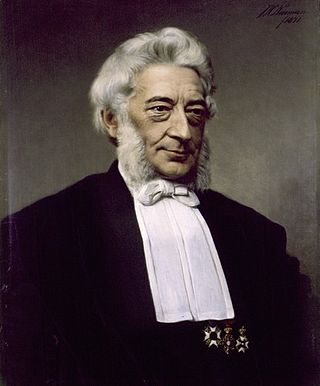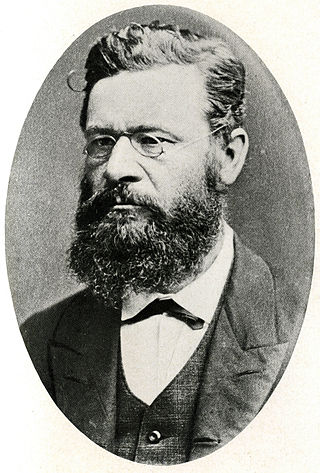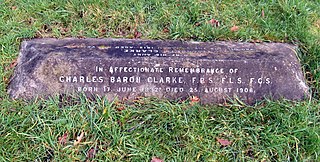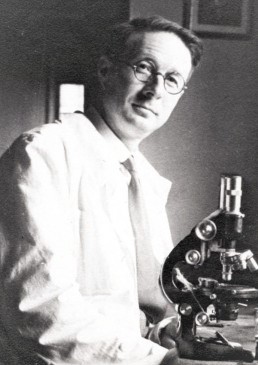
Edward Tuckerman was an American botanist and professor who made significant contributions to the study of lichens and other alpine plants. He was a founding member of the Natural History Society of Boston and most of his career was spent at Amherst College. He did the majority of his collecting on the slopes of Mount Washington in the White Mountains of New Hampshire. Tuckerman Ravine was named in his honor. The standard botanical author abbreviation Tuck. is applied to species he described.

Carl Johan Fredrik Skottsberg was a Swedish botanist and explorer of Antarctica.

Friedrich Anton Wilhelm Miquel was a Dutch botanist, whose main focus of study was on the flora of the Dutch East Indies.

Vernonia is a genus of about 350 species of forbs and shrubs in the family Asteraceae. Some species are known as ironweed. Some species are edible and of economic value. They are known for having intense purple flowers. There have been numerous distinct subgenera and subsections named in this genus, and some botanists have divided the genus into several distinct genera. For instance, the Flora of North America recognizes only about twenty species in Vernoniasensu stricto, seventeen of which are in North America north of Mexico, with the others being found in South America.

Petter Adolf Karsten was a Finnish mycologist, the foremost expert on the fungi of Finland in his day, and known in consequence as the "father of Finnish mycology".
Gustav Lindau, was a German mycologist and botanist.
Leslie Pedley was an Australian botanist who specialised in the genus Acacia. He is notable for bringing into use the generic name Racosperma, creating a split in the genus, which required some 900 Australian species to be renamed, because the type species of Acacia, Acacia nilotica, now Vachellia nilotica, had a different lineage from the Australian wattles. However, the International Botanical Congress (IBC), held in Melbourne in 2011, ratified its earlier decision to retain the name Acacia for the Australian species, but to rename the African species.

Charles Baron Clarke was a British botanist. He was born at Andover, the eldest son of Turner Poulter Clarke. He was educated at King's College School, London, and at Trinity and Queens' Colleges, Cambridge. He began the study of law at Lincoln's Inn in 1856 and was called to the bar in 1860. He lectured in mathematics at Presidency College, Calcutta, from 1857 to 1865. Clarke was Inspector of Schools in Eastern Bengal and later of India, and superintendent of the Calcutta Botanical Garden from 1869 to 1871.

Satakentia liukiuensis, is a species of palm tree. They are endemic to Ishigaki Island and Iriomote Island in the Yaeyama Islands, the south-westernmost of the Ryukyu Islands, Japan. It is the only species in the genus Satakentia.
Setchellanthus caeruleus is a species of pungent shrub with large blue flowers. It is placed alone in the genus Setchellanthus, which is in turn, is placed alone in the family Setchellanthaceae. It is endemic to Mexico.

Hans Schinz was a Swiss explorer and botanist who was a native of Zürich.
Ludwig Benjamin (1825–48) was a German botanist who contributed to Carl Friedrich Philipp von Martius' Flora Brasiliensis. The genus Benjaminia is named in his honour.

Robert Kühner was a French mycologist most notable for reviewing many forms of agaric genera.
Duboscquella is a genus of dinoflagellates.
Arthur Francis George Kerr (1877–1942) was an Irish medical doctor. He is known particularly now for his botanical work, which was important for the study of the flora of Thailand.

Carlo Luigi Spegazzini, in Spanish Carlos Luis Spegazzini, was an Italian-born Argentinian botanist and mycologist.
Fischerula is a genus of two truffle-like fungi in the family Morchellaceae. First described from central Italy by Oreste Mattirolo in 1928, the genus name honors Swiss mycologist Eduard Fischer. The type species Fischerula macrospora is known only from Italy, while Fischerula subcaulis is found in coniferous and mixed forests of Oregon and Washington.
Megahertzia is a monotypic genus of flowering plants in the family Proteaceae. The sole species, Megahertzia amplexicaulis, is endemic to Queensland. It is found only in part of the Wet Tropics World Heritage Area between the Daintree River and Cape Tribulation.
Theodoric Valeton was a Dutch botanist.









